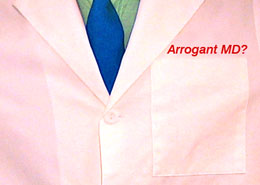Are doctors arrogant or stuck-up?

Q: Hello Dr. Pezzi,
I volunteer at a hospital and I encounter many physicians, but the majority of them are quite stuck-up in my opinion. My goal is to become a doctor, hopefully an ER doctor. When I catch one in the elevator or in the lobby I tend to distinguish them quickly, and jump at the opportunity to ask them questions about their profession, but usually they just scurry out of sight or completely ignore me. I really wish I had some kind of insight into the life of a doctor. I was just hoping that you would give me some real advice, none of that cookie cutter “you can do it” stuff; I really want to know (in depth) the pros and cons of being an ER doctor, how to get there, and helpful tips to achieve my goal.
Hope to hear from you soon,
Michelle in California
Answer by Kevin Pezzi, MD: First, about “that cookie cutter 'you can do it' stuff.” The Chief of one of the departments in a teaching hospital affiliated with Wayne State University School of Medicine, my alma mater, got to be where she is today precisely because I extinguished her anxiety about whether she had The Right Stuff to become a doctor by affirming that she did: by repeatedly telling her that she could do it. When she would visit me or call during conversations that often stretched to three hours, one of our most frequent discussions centered on her burning desire to become a doctor but her conviction that she wasn't smart enough to be one—or, if she were, not smart enough to be a good one. I did not have the benefit of a crystal ball to know that she would later become the head of a department in a prestigious hospital, but I was convinced that she did indeed have what it takes to become a very good doctor. So I told her: again, and again, and again, until I inculcated that conviction in her mind.
Incidentally, I am more honest than encouraging, because I told another friend who wanted to become a nurse that she should forget about it. She was smart enough (she is now an attorney), but I was alarmed by her deficiency of dedication to patients by not putting them first. Anyone who truly cares about patients would put his or her nose to the grindstone, knowing that whatever fun one was forgoing was markedly less important than the lessons that would later save lives and improve the health of myriad people. Before my college and medical school days, I was obsessed with snowmobiles and snowmobiling. However, once I decided to become a doctor, I could go for years, even driving a car through a snowstorm, without ever once thinking of snowmobiles. I hit the “off” switch in my brain and crowded out thoughts of snowmobiling because I knew it would be too much of a distraction; I had better things to do, primarily putting my nose to the grindstone, studying day and night, and working multiple jobs to finance my education.
The friend who aspired to become a nurse listened to me at the time we dated, but after we broke up and lost contact for awhile, she was accepted into nursing school. However, as she later told me, it didn't go well. She was, just as I thought, not a good fit for the nursing profession, so she instead went into law.
Now about doctors being stuck-up. First, let me admit that some are indeed dripping with arrogance. They are convinced they are members of a superior species. In their minds, nurses are usually dumb, most patients are blithering idiots, and they are practically royalty rubbing shoulders with God.
Oh . . . my . . . God!
However, I think far more doctors are perceived to be arrogant than actually are. Humans possess an innate inclination to stereotype others: to fit them into neat little boxes that simplify mental processing. We subconsciously look for even a shred of evidence to confirm our suspicions, then often put our blinders on as we persist in the formulaic and oversimplified conceptions. Given the prevalence of the “doctors are stuck-up” idea, it isn't surprising that people are quick to judge doctors as being that way when they may just be distracted, thinking of patients, or in a rush to take care of one. Imagine that—a busy doctor!

Doctors in a hospital are rarely strolling about with enough time on their hands to, for example, answer questions from someone such as yourself who likely would not be satisfied with a quick reply. Instead, they are usually rushing to do something: check an x-ray, go see a patient, or get whatever work he or she is doing done as soon as possible so the doc can rush to the office to see patients who often are tired of waiting. Until someone invents a way to squeeze more than 24 hours into a day (I've invented the next best thing, BTW), doctors will always be rushed. Taking care of patients is enormously time consuming.
My girlfriend is a nurse who detests arrogance in anyone, especially doctors, and she readily admits that she has a hair-trigger for judging doctors to be arrogant. Before we met, she checked me out online and concluded that I was a warm, loving person who truly cared about and tried to help others. Years later, now that she knows me much better, she says that I am the nicest and most generous person she has ever known, always thinking of ways to help people, such as selling my Sea-doo, Ski-doo, and shed to help a deported person reenter the U.S.
One of my former neighbors, a drug rep (pharmaceutical representative) who knew many doctors professionally and personally, told me how unlike most doctors I was: they were sometimes arrogant and invariably stingy, while I was down-to-earth and very generous. I gave him and his family many things: a gasoline-powered leaf blower, a huge air hockey table, various goodies that I baked (usually fat-free ones that tasted twice as good as ones with fat), a cordless phone for his oldest daughter when she was recovering from knee surgery that limited her mobility, Jell-O cast in a custom “Get Well Soon, Becky!” mold I made to lift her spirits during her protracted recovery, a handheld bug zapper, countless free pizzas, free babysitting services, free medical advice with housecalls, free books, and other gifts. I spent a lot of time with his kids, taking them snowmobiling, jet skiing on my Sea-doo (the one I'm now giving away), going on walks or bike rides, playing baseball, helping them with their homework or computer, swimming, and riding a motorized toboggan I made. I also bought a mini-snowmobile (a Ski-doo Mini-Z) for the kids to ride, not realizing they preferred to drive my full-size snowmobile. I helped him take out his dock for the winter in water so cold it chilled my bones. I took care of his dog when they vacationed, and I'd snowblow his driveway when he was traveling on business. I'd snowblow the driveways of other neighbors, including an elderly disabled man who lived about a mile away.
I could fill a book listing the things I've done to help others, such as spending entire days helping my Mom so she could relax and enjoy herself after work. I did everything I could think of: I vacuumed, dusted, and polished the entire home, did laundry, ironing, and dishes, cleaned the garage, and mowed and trimmed our huge yard. Years later, after I became a doctor, I built a shed for her: my first one, before I learned to make really fancy ones (such as my Lighthouse shed, Alpine shed, and Schoolhouse shed), but it did include a hand-carved door that many neighbors judged to be a work of art. I also built a cupola for her home, installed shutters, made birdhouses, sanded her deck, installed wainscoting and fancy custom trim, mowed her yard the size of a park, made her garage look like it belonged on the cover of a magazine, and on and on.
I've literally spent years answering questions from people who aspire to become doctors, filling two websites (this one and ERbook.net) with countless tips and practical advice for how to become not just a doctor, but a superb one. One of the myriad topics I covered was the pros and cons of being an ER doctor. You also requested information on “how to get there, and helpful tips to achieve my goal.” That is the primary focus of my ER sites that are packed with the equivalent of several books full of info.
In spite of all that giving, I still have quick-to-judge people accusing me of being a typical, self-centered, arrogant doctor. Go figure. I doubt that anyone making such an accusation has done even a tenth of what I've done to help others, even those I had zero obligation to help, such as the disabled neighbor whose driveway and porch I dug out from chest-deep snow.
As you surely know from surfing the Web, most doctors do not waste even a minute of their precious time answering questions from students who aspire to become doctors. Instead, they are doing things they deem more important: golfing, boating, traveling, dining out, and living the good life. Because they are essentially invisible on the Internet, it is easy to maintain their pristine image. On the other hand, by publishing my thoughts on a variety of topics, people with a hair trigger for harshly judging others can make a mountain out of a molehill in taking something out of context, magnifying it under a microscope, and firing off an incandescent message berating me for an imperfection, real or imagined. Mostly the latter, since the common denominator amongst my critics is overt mental illness. You should read the rambling diatribe I received yesterday! Kooks are everywhere, and the anonymity of the Internet gives them free rein to vent their spleens and give me a piece of their small minds.
Thus while I don't fit the image of a stuck-up doctor, arrogance is indeed present in enough doctors to sustain the “doctors are arrogant” stereotype. This is found not only in physicians and surgeons, but also in others with doctorate degrees, such as Amy, a Doctor of Psychology (Psy.D.) who works with one of my psychologist friends (I'll call her Megan). Amy tried but failed to get into a PA school, so she went into psychology instead, graduating from an unaccredited university. Think about it: she was rejected by PA schools, a step below medical school, and she does not have a professional degree from an accredited university, yet from what Megan says, Amy loves to call herself “doctor” and have patients call her that.

I firmly believe that titles should be meaningless and that practitioners should compete for patients on the basis of their test scores. If your child was blue and not breathing, would you want a doctor who just squeaked by, or someone like me who graduated in the top 1% of his medical school class? Obviously the latter, which explains why my success rate in codes (cardiopulmonary resuscitations) was considerably better than average; I went over 18 months without losing a single patient in a busy ER that handled codes every day as other ER docs put patient after patient into the ground. That was at a time when less than 5% of codes were successful (a figure that hasn't improved much), so saving every patient in a busy ER (sometimes running multiple codes at the same time) for over a year and a half ought to earn me a place in the ER Doctor Hall of Fame, if there were such a thing. Instead of recognizing outstanding doctors, our society glorifies professional athletes, Hollywood stars, and celebrities more noted for their dysfunctional behavior than talent. What they do is so much more important!
How did I do so much better than average in saving patients? I figured that people would be more impressed by what I did for them or their loved ones than they would be impressed by my degree, so I put my nose to the grindstone. But not Amy and others like her. She basks in the glory of being a doctor, or at least being called a doctor, so that's good enough for her. When she isn't coming in late to work or leaving early, she is planning her next vacation, wine tasting weekend, or other frivolity. I am less concerned about her unaccredited degree than I am her fixation on fun when there are better things to do, such as becoming more proficient and therefore more helpful to patients. She specializes in diagnosing and treating cognitive deficits, doing a reasonably good job of the former and an abysmal job of the latter, not giving her patients even 1% of the information that could help them stave off future cognitive deterioration or even to reverse it. She just goes through the motions, doing what other neuropsychologists do, patting herself on the back when I'd like to kick her in the butt for being so lazy. I am not a psychologist or psychiatrist, but what I know about improving brainpower could fill a few books. I put some of that info into my ER sites, so have fun reading them! :-) If you're hungry to know more, read my book on boosting brainpower.
One more thing . . . If you are attractive, that is potentially another reason why doctors might be eager to quickly distance themselves from you. In another ER topic, I mentioned how I casually said “hello” to a hospital worker I didn't like (unbeknownst to her), but from the routine courteous way I treated her during a recent ER visit when she was my patient, she presumed I liked her. The fact that I said “hello” confirmed her suspicion. Based on that single hello on my way to lunch, by the time I returned the hospital was buzzing with rumors she started that I had the hots for her when I really wanted nothing to do with her. Doctors are just one of the many people who work in hospitals, but they get more than their share of attention.

I was good friends with two stunningly attractive lesbians in a relationship, they revealed to me as we ate dinner in my home one weekend night we all had off from the hospital. They loved each other, I learned, and they really liked me because they said I was so down-to-earth, kind, and accepting (see my article on Why homosexuals should not be blamed for their sexual orientation).
Flash-forward a few weeks, and my MD boss was jealously asking me about them after hearing a rumor that I was banging those two supermodel clones, each as attractive as the adjacent model. In truth, I wanted to; what red-blooded single man wouldn't jump at the chance to sleep with one—or two—young beauties with hot bodies? However, their love for one another exceeded their mutual desire to sleep with me, something they also revealed, yet that is the rumor that flew around the hospital, likely because I was a doctor and hence the focus of more attention than I wanted.
Being accused of things that exist only in the minds of rumormongers gets old really fast. All it takes is for a doctor to be the target of one rumor, or even to hear of a doctor victimized by one, before he becomes very wary when speaking with attractive employees or volunteers.
Incidentally, I worked in many hospitals, but the ones that employed me and my lesbian/bisexual friends must have selected female applicants out of a Victoria's Secret catalogue, judging by the prevalence of their exceptional beauty. We had an ER nurse who was a former Mrs. Michigan, and many other nurses who made her look like a Plain Jane, with beauty that female Hollywood stars would envy. Unbelievably gorgeous women were everywhere: registration clerks, secretaries, lab and x-ray techs, medical records, and even in administration: the nurse in charge of the Critical Care Units (ER, ICU, CCU) was middle-aged but so yummy as to be practically irresistible, if you could overlook her personality (I could not), which infuriated the nurses and incensed the doctors. Now that was an arrogant person! I suspect her mesmerizing beauty helped her get a job I did not think she was qualified for. She would sometimes lead me into a room, close the door, smile, and sit with me on a couch, crossing her legs in a sensuous way that hiked her shockingly short miniskirt even farther up her luscious legs. Then she'd pop a question that made me question her competence. Did she really want to know something so basic? Or did she just want to show me more of her legs?
This wide-ranging discussion continues in part 2 >
Back to the main Question & Answer page


